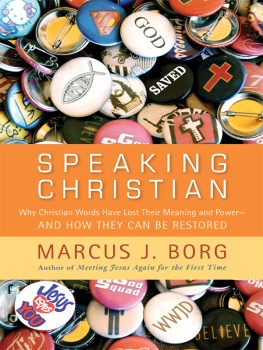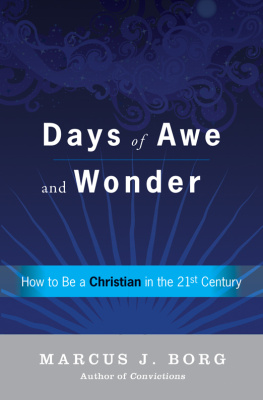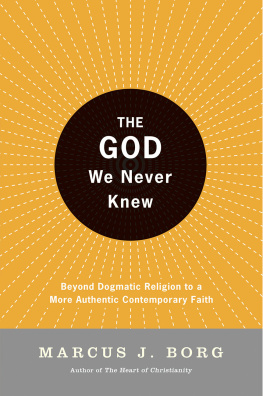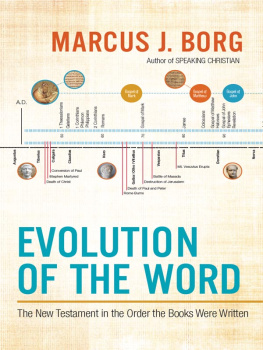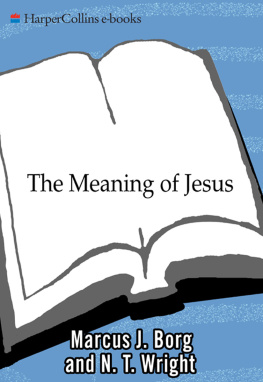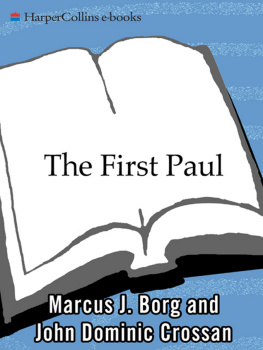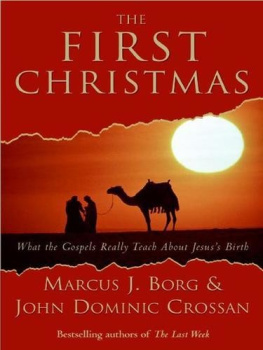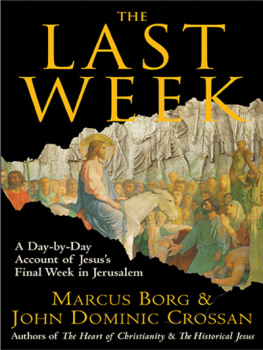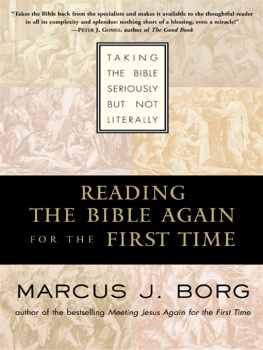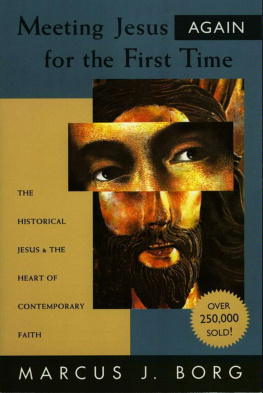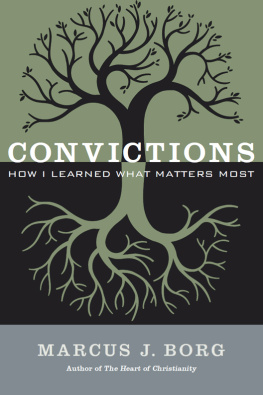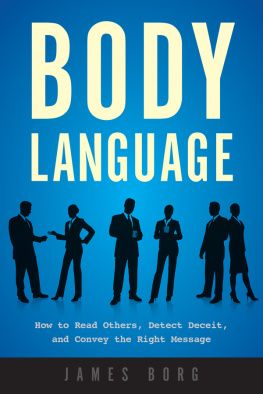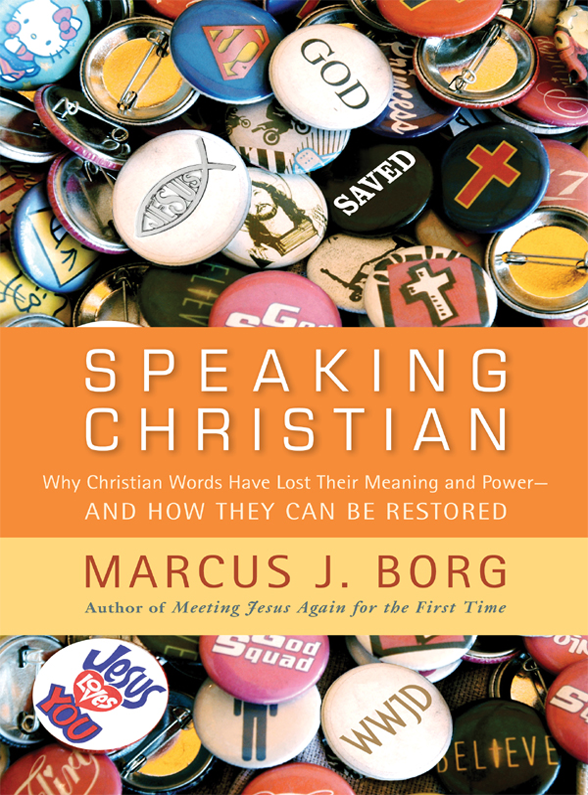To my sister Beverly, who died in March 2010, soon after her eightieth birthday. She was my big sister, twelve years older than I, a second mother, I suspect, when I was a baby and toddler, and throughout our lives together a best friend.
C hristian language has become a stumbling block in our time. Much of its basic vocabulary is seriously misunderstood by Christians and non-Christians alike. Big words like salvation, saved, sacrifice, redeemer, redemption, righteousness, repentance, mercy, sin, forgiveness, born again, second coming, God, Jesus, and Bible and collections of words like the creeds, Lords Prayer, and liturgies have acquired meanings that are serious distortions of their biblical and traditional meanings.
The misunderstandings flow from two major causes shaping the way Christian language is heard. The first is the literalization of language in the modern period, affecting Christians and non-Christians alike. The second is the interpretation of Christian language within a common framework that I call heaven and hell Christianity, which I describe more fully in Chapter 1. When this is the primary framework for understanding Christianity, as it often is, it diminishes and distorts the meaning of Christian language.
Christians in this country (and elsewhere) are deeply divided by different understandings of a shared language. About half (maybe more) of American Christians believe that biblical language is to be understood literally within a heaven-and-hell framework that emphasizes the afterlife, sin and forgiveness, Jesus dying for our sins, and believing. The other half (maybe less) puzzle over and have problems with this. Some have moved on to another understanding of Christian language. The differences are so sharp that they virtually produce two different religions, both using the same Bible and the same language.
This books purpose is to exposit an alternative understanding, one that draws on the Bible and premodern Christian tradition. It has a drumbeat. Again and again, it compares and contrasts the contemporary meanings of Christian language with their often very different biblical and traditional meanings. Again and again, it names the effects that literalization and the heaven-and-hell framework have had upon the meanings of Christian language. Again and again, it reveals the more ancient and authentic meanings of speaking Christian and tries to connect these reinvigorated meanings to the realities we face in the twenty-first century.
The books purpose is to redeem or reclaim Christian language in all of its richness and wisdom. Indeed, I had thought of titling the book Redeeming Christian Language, but then I realized that redeeming is one of the words that need redeeming. Today it is usually associated with being redeemed from our sins by the death of Jesus, our Redeemer. However, its more ancient and biblical meaning works very well. To redeem means to set free from slavery, bondage, captivity; it is not about being saved from our sins. In this sense, Christian language needs to be redeemedto be set free from its captivity to contemporary literalism and the heaven-and-hell Christian framework.
Because I have written books about Jesus, God, the Bible, and the heart of Christianity, some repetition of topics treated in them is inevitable. However, when I do treat material in this book that I have presented before, the exposition is fresh as well as more concise.
The chapters are of varying lengths. Some are as long as traditional book chapters. Others are only two or three pages. The deciding factor was how much exposition was needed to clarify the topic of the chapter.
This book might also be seen as a Christian primer. A primer teaches us how to read. Reading is not just about learning to recognize and pronounce words, but also about how to hear and understand them. This books purpose is to help us to read, hear, and inwardly digest Christian language without preconceived understandings getting in the way. It is about learning to read and hear the language of our faith again.
S peaking Christian, by which I mean knowing and understanding Christian language, is in a state of crisis in North America. I suspect the crisis extends to other parts of the world as well, but I write about the cultural terrain I know best. The crisis is twofold. For many, an increasing number, Christianity has become an unfamiliar language. Many people either do not know the words at all or, if they have heard the words, have no idea what they mean.
But Christian illiteracy is only the first part of the crisis. Even more seriously, even for those who think they speak Christian fluently, the faith itself is often misunderstood and distorted by many to whom it is seemingly very familiar. They think they are speaking the language as it has always been understood, but what they mean by the words and concepts is so different from what these things have meant historically, that they would have trouble communicating with the very authors of the past they honor.
So why do I express this crisis as a problem of language? Because language is the medium through which people participate in their religion. To be part of a religion means being able to speak and understand its language. Every religion has a basic vocabulary: its big words and collections of words, spoken and heard in worship, embodied in rituals and practices.
Thus to be Jewish means speaking Jewish; to be Muslim means speaking Muslim; to be Buddhist means speaking Buddhist; and so forth. By speaking I do not mean merely knowing either the ancient languages of these religions or their modern descendants. I mean something more basic: the way practitioners use the concepts and ideas from their religion as a lens through which to see the world, the way they use them to connect their religion to their life in the world.
To use an illuminating phrase from recent scholarship, religions are cultural-linguistic traditions. What this means is both simple and important. Every religion originated in a particular culture and thus used the language of that culture, even if in ways that radically challenged it. If a religion survived over time, it became a cultural-linguistic tradition in its own right, with its own language, its basic vocabulary, sacred texts and stories, rituals and practices. These are often organized into comprehensive systems of thoughtwhat Christians call theology, including doctrines and dogmas.
In this respect, being Christian (or Jewish or Muslim) is like being French (or Turkish or Korean). One of the criteria for being French is the ability to speak French. Another is being able to understand French. We would not think someone fluen t in French if that person could only speak it, but not understand it. In the same way, literacy means more than simply being able to make sounds out of written words. It also involves having some understanding of what the words mean. Christian literacy means not simply the ability to recognize biblical and Christian words, but also to understand them.
Of course, being Christian is about more than words, just as being French is about more than fluency in French. One doesnt become French simply by learning the language. Being French also involves membership in a community and an ethos, a way of life. So also being Christian is about being part of a community and an ethos, a way of life. It is about more than language, but not less.
Christian language is grounded in the Bible and postbiblical Christianity. It includes the words used, heard, sung, and prayed in worship, devotion, teaching, and community. To be Christian is to know, use, and be shaped by this languageto live ones life with God within the framework of this language.

